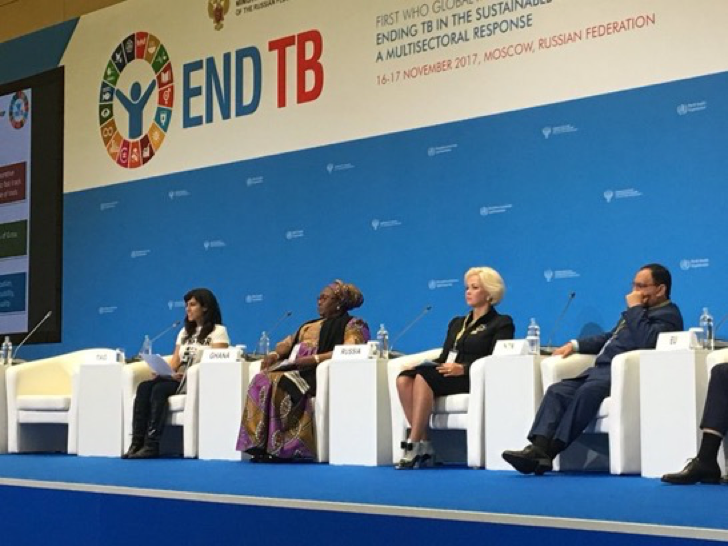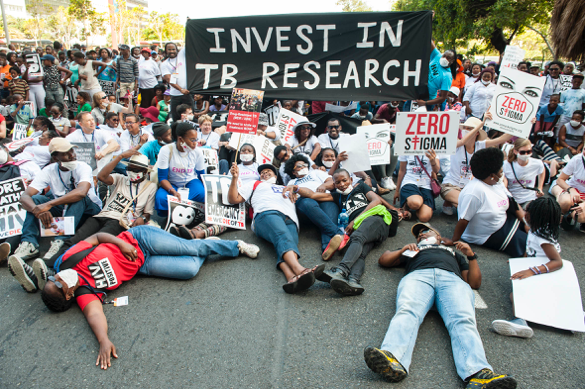Presentations:
Remarks on TB research at the WHO Global Ministerial Conference on Ending TB
By Erica Lessem

Remarks by Erica Lessem, Deputy Executive Director – TB Project
Global Ministerial Conference on Ending TB in the Sustainable Development Era
Moscow, Russian Federation
November 17, 2017
Using lessons learnt from HIV, how do you see civil society and advocacy communities’ role in helping increase financial commitment by the global community to close the gap of TB R&D funding?
“The HIV movement has taught us that with funding for innovation and political will for implementation, devastating epidemics can be tamed. The HIV movement also taught us that fierce activism may be necessary to bring about this political will and funding.
The esteemed Dr. Tony Fauci who just spoke, is an ally of activists. He comes to us from the U.S. National Institutes of Health, the leading funder of TB research, and an exemplary organization in engaging affected communities in research design and implementation.
But let the record show: it was not always so.
In May 1990, the AIDS Coalition to Unleash Power “Stormed the NIH.” One thousand protesters gathered. They demanded many of the same things we need in TB today: more and better treatment options—especially for co-infections. An end to the underrepresentation of vulnerable groups in clinical trials. More engagement of affected communities in the research process.
They were successful. Shortly after, NIH’s AIDS Clinical Trials Group opened its doors to HIV advocates and community members.
Let the record show: over 30 new drug chemical entities have been approved for HIV in 27 years. Three new drugs have been approved for TB in the past 55 years. Part of this disparity is no doubt due to higher commercial interest in HIV. But all the more reason to look to our governments for concrete financial commitments to end TB.
We, as civil society, are here because despite talk of ending TB, incidence and mortality are stagnant, and drug-resistant TB is on the rise. We can and must do better. And central to doing better is research into new interventions to fight TB. For these, we need to triple available funding for TB research. Our report shows that TB research funding is finally on the rise. We must capitalize on this hopeful momentum to close the research gap.
We’ve learned from HIV activism to be bold in our demands, and specific in our targets. We are asking every country to invest in TB research just 0.1% of what it already spends on research overall. You can find your country’s target, and learn how we came to this number, by reading this brief.
Another tactic we have learned from HIV activism is to give praise where praise is due, Or when needed, to name & shame.
Let the record show: the U.S. government is the leading investor in TB R&D, but must increase its spending by over 100 million dollars per year. India has shown remarkable leadership in TB R&D, leading the BRICS countries in reported spending, but India must triple its investments. Germany must increase its TB research funding sixfold. We laud Japan’s leadership on Universal Health Care, and for working multisectorally to establish the GHIT fund, but given Japan’s strong capacity for R&D, we look to Japan to invest 150 million dollars more per year in TB research.
If these number sounds like a lot, remember that if unabated, TB will cost the economy one trillion dollars over the next 15 years according to a recent analysis by KPMG.
In line with the recommendations in the WHO Policy Paper released today, we welcome the BRICS TB Research Network mentioned by President Putin yesterday. This Network will diversify support for TB R&D, which is currently overdependent on the commendable investments of the U.S. government and the Gates Foundation. This TB Research Network must be fully funded. We urge each delegation to commit to increase funding in line with our targets before the U.N. High Level Meeting.
But funding is not enough. This network must be efficient and collaborative. It should support innovative finance models such as the Life Prize. It should include mechanisms to promote access, and avoid the public paying twice to first develop and then procure innovations. The research it funds must be inclusive of community input, in line with Good Participatory Practice. And evidence-based outputs must be rapidly taken up to promote the right to health and right to science.
If you want TB to benefit from even a fraction of the research success and epidemiological progress in HIV, you have to bring the political will, the funding, and the openness to communities and their ideas and criticisms that have been seen in the HIV response.
 This photo is from a march and die-in organized by the Treatment Action Campaign in 2015 in Cape Town, where civil society issued a call for BRICS countries to triple TB R&D funding. I take this opportunity to quote from TAC’s General Secretary, Anele Yawa, at the closing ceremony of the Union Conference that that march surrounded:
This photo is from a march and die-in organized by the Treatment Action Campaign in 2015 in Cape Town, where civil society issued a call for BRICS countries to triple TB R&D funding. I take this opportunity to quote from TAC’s General Secretary, Anele Yawa, at the closing ceremony of the Union Conference that that march surrounded:
‘Comrades, the lack of investment in TB is a political problem.[…] at its essence it is about governments not being held accountable for failing to respond to TB. We are not going to change it if we accept business as usual. […]We will have to organise and mobilise. And then be willing to our hold our governments to account.’
We are glad for the opportunity of this Ministerial Conference and the High Level Meeting to acknowledge TB as the political problem that it is.
So let the record show: We come in a spirit of collaboration to end TB. We expect full funding for the TB response, including TB R&D, to come out of the High Level Meeting. And we are willing to hold our governments to account.”
